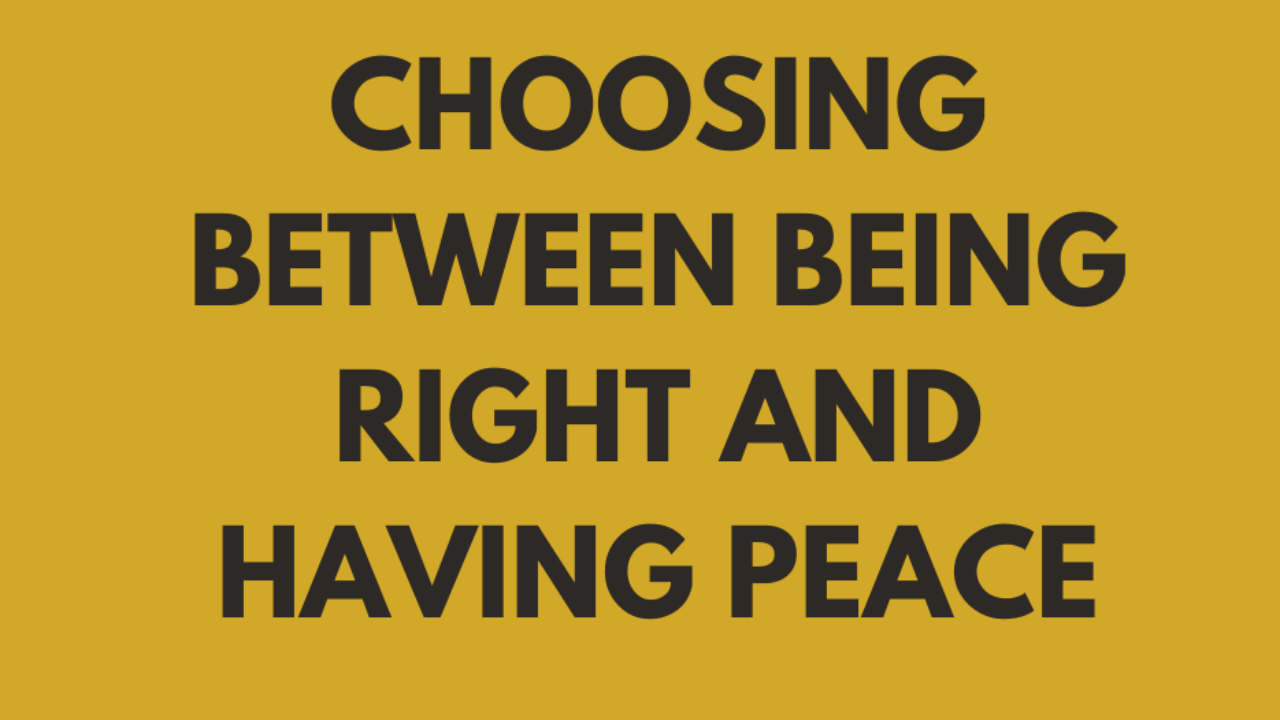Striking a Balance: Choosing Between Being Right and Having Peace

In our journey through life, we encounter countless situations that test our values, beliefs, and principles. Among these challenges, a common dilemma arises: would you rather be right or would you rather have peace? This timeless question urges us to reflect on the balance between asserting our beliefs and maintaining harmonious relationships with others. In this article, we explore the significance of this choice and the potential implications it has on our lives and the world around us.
The Urge to Be Right
The desire to be right is deeply ingrained in human nature. We naturally seek validation and recognition for our opinions, knowledge, and judgments. This quest for being right can stem from our need to feel significant, competent, and respected by others. We may believe that being right gives us a sense of control over our lives and validates our self-worth.
In some cases, being right can be essential, such as in academic pursuits, scientific research, or making critical decisions. However, problems arise when the pursuit of being right overshadows our ability to empathize with others, understand diverse perspectives, and collaborate effectively.
The Price of Being Right
In our quest to be right, we may unintentionally alienate those around us. Arguments can escalate into conflicts, and the desire to prove oneself can become a barrier to open communication and compromise. Relationships with loved ones, friends, and colleagues may suffer as a result. The focus on being right might lead to a breakdown in communication, fuel resentment, and create an environment of hostility.
Moreover, the pursuit of being right can lead to a closed mindset, preventing personal growth and learning. When we are fixated on proving ourselves right, we may become less receptive to new ideas, alternative viewpoints, and constructive criticism. This closed-mindedness limits our potential for self-improvement and hinders our ability to build meaningful connections with others.
The Value of Peace
Peace, on the other hand, is a state of harmony, tranquility, and understanding. Choosing peace does not mean sacrificing one's values or compromising on important principles. Instead, it involves cultivating empathy, active listening, and a willingness to understand diverse perspectives. When we prioritize peace, we foster an environment of mutual respect, cooperation, and collaboration.
Choosing peace does not imply avoiding difficult conversations or disagreements; rather, it encourages us to approach these situations with an open heart and mind. By seeking common ground and understanding, we can find creative solutions that benefit all parties involved.
Benefits of Prioritizing Peace
Embracing peace in our interactions with others yields numerous benefits. First and foremost, it strengthens relationships, creating a supportive network of friends, family, and colleagues. In a peaceful environment, individuals feel safe to express themselves without fear of judgment or ridicule, fostering emotional well-being and trust.
Additionally, prioritizing peace allows for personal growth and a broader understanding of the world. By engaging in constructive conversations with people who hold different viewpoints, we broaden our perspectives and enrich our knowledge.
Striking a Balance
Striking a balance between being right and having peace is a delicate art that requires self-awareness and emotional intelligence. It is essential to recognize that our beliefs and opinions are valid, but so are those of others. Acknowledging that differing perspectives do not invalidate our own allows us to approach conversations with empathy and an open mind.
Instead of aiming to "win" arguments, let us focus on understanding, learning, and finding common ground. Sometimes, choosing peace may involve gracefully agreeing to disagree, recognizing that different people have diverse life experiences and backgrounds that shape their viewpoints.
Conclusion
The choice between being right and having peace is a profound one that can significantly impact our lives and relationships. While being right can boost our ego, choosing peace fosters a nurturing environment that allows us to connect with others on a deeper level. It empowers us to embrace diversity, cultivate empathy, and find solutions that benefit everyone.
In a world that often seems divided by opposing beliefs and ideologies, prioritizing peace becomes more crucial than ever. Let us remember that choosing peace does not require us to abandon our values; rather, it encourages us to seek understanding, harmony, and cooperation. By finding this delicate balance, we can create a world where empathy and compassion prevail, leading to a brighter and more harmonious future for all.
Stay connected with news and updates!
Join our mailing list to receive the latest news and updates from our team. Your information will not be shared.

